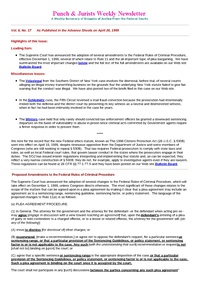Here the Court dismissed two money transmitting counts under 18 USC § 1960 on the grounds that the underlying State statute was unclear and therefore both the rule of lenity and the constitutional requirement of fair notice justified dismissal.
As this case shows, sometimes it is worth the …
Here the Court reversed a mail fraud conviction because the prosecution misled both the defense and the court by presenting its chief witness as a neutral and disinterested party when he had been actively involved for years.
In this case, a divided panel from the Sixth Circuit reversed …
Here the defendant contended that the district court erred when it sentenced him based on 1994 U.S.S.G. § 2A1.1, the guideline for first-degree murder, instead of 1994 U.S.S.G. § 2K1.4, the guideline for arson and
property damage by use of explosives. In affirming the district court's choice of § …
In this case a divided panel from the Fifth Circuit held that only rarely will a Federal District Court be justified in granting a convicted law enforcement officer a downward departure on the basis of the officer's special vulnerability to abuse while in prison. While the Court recognized that …
Rule 35(c) provided that the court "acting within 7 days after the imposition of sentence, may correct a sentence." In reviewing the history of Rule 35(c), the Court determined that when Rule 35(c) was amended, the Committee expressly noted that subscetion (c) was intended to codify the court's "inherent …
The Court stressed that the stipulation in question was a limited one: "Mastrangelo "had the chemical background to know the ingredients and equipment necessary to make methamphetamine." Significantly, Mastrangelo did not stipulate that he knew how to make methamphetamine. The difference is important. In fact, the District Court refused …
In this case the defendant relied upon the holding in U.S. v. Fisher, 106 F.3d 622 (5th Cir. 1997) for the proposition that, by raising her prior convictions during direct examination (as expressly permitted by a 1990 amendment to Fed.R.Evid. 609) in order to "remove the sting" of having …
In this case the Eighth Circuit joined all the other circuits in rejecting the Singleton-type argument that the provisions of the Federal Anti-Gratuity Statute prohibit prosecutors from making offers of leniency to its witnesses.
The Court stated that "the statute does not sweep so broadly as to prevent …
Reversing a decision reported at 139 F.3d 748, the en banc court held that the district court erred in excluding relevant evidence corroborating the defendant's self-defense theory that her boyfriend was violent.
Citing its decision in Bauman v. United States Dist. Court, 557 F.2d 650, 654-55 (9th Cir. 1977), the Court identified the following five factors to be considered when determining whether an exercise of mandamus jurisdiction is proper: "(1) The party seeking the writ has no other adequate means, such …
